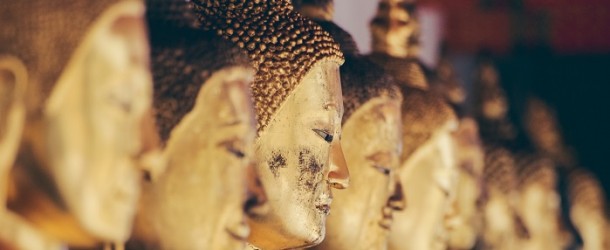In my continuing studies of Buddhism, a recurring theme capturing my attention is the idea of not having fixed opinions or views. I have seen this idea referred to as “beginner’s mind,” “don’t know mind,” and “not sure mind” by various esteemed teachers. While my reaction to these teachings is often one of resonance, especially as it relates to my yoga and meditation practice, and my relationships with others, I sometimes feel uneasiness at how these teachings might relate to my strong opinions about veganism. Is my vegan advocacy an example of the true cause of suffering according to the Buddha, i.e., wanting things to be different than they are?
Based on factual information I have learned about the treatment of animals, the health effects of eating animals and their secretions, and the devastating effects of animal agriculture on the environment, I have arrived at a point of certainty that living a vegan lifestyle is the right choice. I am extremely happy to have made this choice, and I want other people to make it also. I feel, at times, angry and judgmental when people choose not to be vegan, especially if they are close to me and/or are practitioners of spiritual disciplines such as yoga or Buddhism.
Of course these feelings of judgment and anger are painful, for me (always) and for others (who probably sense my usually unspoken negative feelings more often than I realize). This suffering I experience from having an idea about how things should be—from wanting things to be different from how they are—is clear evidence of why Buddhist teachers advise “don’t know mind.” Buddhism, in my experience, is above all a practical and wise system. In my understanding, it is all about acknowledging that there is suffering and that this suffering is caused by wanting things to be different from how they are. Fortunately, Buddhism also holds that it is possible to end suffering, and it provides a path for ending suffering.
The Noble 8-fold Path
The path to end suffering, according to Buddhism, is the noble 8-fold path: right view, right intention, right speech, right action, right livelihood, right effort, right mindfulness, and right concentration. Particularly relevant to the relationship between “don’t know mind” and veganism, I believe, are right view, right action, and right speech. With right view, we see things as they really are, free of our opinions and preconceptions. With right action, we practice ethical behavior that avoids exploiting ourselves or others. With right speech, we avoid lying, causing disharmony with our speech, and idle speech or gossip. Another way I have heard right speech described is to say something only if it fits the criteria in the acronym “THINK”: True, Helpful, Inspiring, Necessary, and Kind.

Opinion versus Clear-seeing Intelligence
Pema Chödrön addresses the topic of social activism from a Buddhist perspective in her book, When Things Fall Apart: Heart Advice for Difficult Times. In her discussion, she states the importance of distinguishing between opinions and “clear-seeing intelligence.” According to Chödrön, “the more clearly we can see, the more powerful our speech and our actions will be.”
The information that convinced me to adopt a vegan diet was learned through a willingness to see clearly and to open myself to the pain and discomfort of some very inconvenient truths—in other words, through clear-seeing intelligence, not opinion. In a sense, I believe this was an experience of overcoming ignorance, one of the three poisons according to Buddhist teachings. The three poisons, which also include passion/clinging and aggression/aversion, are the unwholesome states at the root of suffering.
I am thankful for the willingness to accept the pain of opening myself to the truth of how animals are treated. I believe this openness and caring toward the pain of other beings is the essence of compassion, which sometimes is defined as the quivering of the heart in response to the suffering of another being. This willingness to see the truth is, in my view, very much in line with the teachings of Buddhism. The current state of many people I know, who love animals and can’t bear to learn about how they’re treated yet still eat them, conversely seems to be a form of ignorance.
Activism without Aggression
Chödrön writes in When Things Fall Apart, “no matter how well documented or noble our cause is, it won’t be helped by our feeling aggression toward the oppressors or those who are promoting the danger. Nothing will ever change through aggression.” She also states that “[cultivating nonaggression] starts with seeing our opinions of ourselves and of others as simply our take on reality and not making them a reason to increase the negativity on the planet.”
If I am angry or forceful in sharing information about veganism, I am not going to help anyone, including the animals. And when I think that someone I love or admire “should” be vegan, I can let go of the idea that I know what’s best for someone else. I can accept that their perceptions and opinions are different from mine, and that their path and decisions are their own. I don’t have to let their choices decrease my love and compassion for them.
Action without Attachment to Outcomes
I have to admit that these ideas can sometimes reduce my motivation to advocate for or write about veganism. How can I act without being attached to the outcome? Clearly, my intent is to help more people decide to become vegan. Perhaps I can be at peace with this intention and with the reality that the outcome is ultimately out of my control? This reminds me of the Zen vows, one of which reads: “Beings are numberless, I vow to save them.” As Norman Fischer wrote in his wonderful book, Training in Compassion: Zen Teachings on the Practice of Lojong, given that we have this precious human life, who are we not to have lofty, unattainable goals? He writes:

But why not have aspirations so lofty they are impossible to fulfill? To have aspirations any less lofty would be to sell ourselves short. The trick is to keep on making effort in the direction of fulfillment of the aspiration but not to think that you will actually complete the job—and not to be dismayed or discouraged by this but instead to be encouraged by it. This is a good approach because you will always have more to do and always be spurred on by the strength of your commitment.
Chödrön also suggests that we put forth our efforts without hope of any certain outcome. She advises that we act as if our every action is the most important thing in the world, while at the same time realizing it actually doesn’t matter at all (a recognition of our smallness in the grand scheme of things, and a reminder to keep our focus in the present rather than the unknown future). This type of paradox is something I encounter frequently in my Buddhist studies, and being able to hold such contrasting ideas with equanimity seems to be a characteristic of spiritual maturity. In contrast with this spiritual maturity is the black-and-white thinking I often experience, which undeniably leads to suffering.
Nonaggression does not Equal Inaction
It is important for me to remember that nonaggression does not mean inaction. In When Things Fall Apart, Chödrön writes:
Just as the Buddha taught, it’s important to see suffering as suffering. We are not talking about ignoring or keeping quiet. When we don’t buy into our opinions and solidify the sense of enemy, we will accomplish something. If we don’t get swept away by our outrage, then we will see the cause of suffering more clearly. That is how the cessation of suffering evolves.
Indeed, the cessation of suffering is a lofty goal and something upon which we as ethical vegans place great emphasis and importance.
Veganism is not Unenlightened
With its objectives of reducing suffering, preventing the exploitation and harm of others, and showing compassion and love toward all beings, veganism is anything but unenlightened. Vegan advocacy, on the other hand, I believe must be practiced with care so that it spreads love and compassion and not aggression and negativity.
Personally, it seems that the times I am most upset about the status quo are when I am not in the moment, doing whatever I can to be helpful in my current situation. Thus, I have set an intention to be on the lookout for ways I can be useful. And I will continue to practice meditation and study the dharma (teachings of the Buddha) so that I may become more present and aware in my life and recognize and act upon opportunities to serve.
